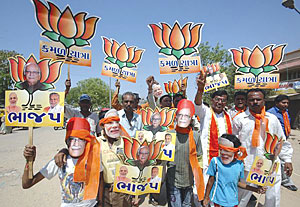 |
The contest in western Champaran is filled with ironies. Hard-hitting film-maker Prakash Jha, a Maithil Brahmin candidate, is fighting on a ticket of a Dalit party headed by Ram Vilas Paswan, who recently attended a convention of our own Dalit Janjati Party in Birganj. Jha's films exposed the politics-crime nexus during Laloo Yadav's 15 year reign. Today, Laloo is in alliance with the Dalit party and figures prominently on Jha's posters. So Jha relies on a votebank comprising of Brahmins (because of his own caste), Muslims and Yadavs (courtesy of Laloo support), and Paswans (due to the party he belongs to).
And if you thought that was complicated, here is more: the villain in Jha's famous film Gangajal was Sadhu Yadav, a not-so-subtle dig at Laloo Yadav's notorious brother in law with the same name. Today, Sadhu Yadav has fallen out with Laloo and is Jha's opponent in the constituency as a candidate of the Congress party. Mind you, Congress, Laloo and Paswan all share power in Delhi. Sadhu is slicing away a part of the Muslim and Yadav vote from Jha.
This split in the 'secular vote' will benefit the local BJP candidate Sanjay Jaiswal who is a part of the alliance headed by chief minister Nitish Kumar, a man seen to have restored a sense of governance in the state. He may win not because of any development dividend, but because Nitish Kumar has embarked on a new process of social engineering. His party's support base rests on non-Yadav intermediate castes, backward Muslims (called Pasmanda Muslims) and the poorest Dalit communities (Maha-dalits). Their alliance with BJP fetches them upper caste votes. This broad social alliance of the Nitish-BJP combine essentially opposes Yadav hegemony.
Still, there is a method to the madness in Bihari politics. And this is bound to be replicated across the border on our side in Tarai politics. Identities are fragmenting to an extent one did not know existed. And those castes that benefited from political power and economic patronage in the 80s and 90s in north India are facing a backlash from those above and below them, the so-called 'post-Mandal churning'.
On our side, the primary beneficiaries of the Madhes movement have been the Yadavs, who wield the real political power, and the upper castes, who have found space at top echelons of professions because of the slogan of inclusiveness. As democracy deepens, the other communities in Tarai have started feeling cheated.
The assertion among Tharus and Muslims is an indication of the growing grievances. Non-Yadav intermediate castes have imported the OBC terminology from India and have already formed the Nepal Federation of Backward Classes. The real contradiction on the ground is between the land-holding Yadavs and the landless labourer Dalits. The upper castes are numerically insignificant, but hold a deep grudge against Yadav dominance.
So there is a possibility of a Brahmin-Dalit alliance against Yadavs like in Uttar Pradesh, or an upper caste, non-Yadav backwards alliance like in Bihar.
If Nepal succeeds in writing a constitution and if we do go through a cycle of elections, we may take the political path already visible in Bihar and UP in Tarai. When identities are the basis of discrimination and developing bonds of solidarity, politics around identity is inevitable.
But it is worth thinking whether we want to emulate the same kind of political culture, where issues of livelihood and class have little resonance and identities keep breaking up in small parcels.
Besides kinship, caste and religion, there are other factors in the Indian elections. With the increase in urban seats, education, and mobility, aspirations have increased. Electricity, water and roads are important issues and performance counts as seen in recent state elections like Delhi and Madhya Pradesh. The ruling Congress government has made issues like employment schemes key campaign slogans.
As India conducts its 15th Lok Sabha elections, it provides a remarkable example to the rest of us South Asians on how to manage diverse aspirations within a democratic political framework.



